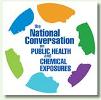
National Conversation's Agenda: Shift Chemicals Policy to Prevention
Two years in the making, the action agenda lists 48 recommendations in seven broad areas. The theme is to redirect U.S. chemicals policy to prevent exposures and to use inherently safer chemicals.
The National Conversation on Public Health and Chemical Exposure's Action Agenda has been released in Washington, D.C., with leaders of the two-year effort saying its recommendations can chart a new course for U.S. policy on chemicals. Rather than attempting to minimize the potential for exposure or harm, or providing treatment in the wake of exposure, the thrust should be to prevent health problems entirely and to use inherently safer chemicals, according to the document.
It says more data collection and better reporting are needed on chemical use and releases, environmental concentrations, levels in humans and other species, and health outcomes.
CDC and its Agency for Toxic Substances and Disease Registry supported the project, which involved working groups formed more than a year ago. The agenda is divided into seven chapters, two of which concern strengthening the capacity of public health and health provider workforces and offering more training on environmental health to these groups, as well as more hands on, real-time training to local emergency responders.
"The National Conversation on Public Health and Chemical Exposures was grounded in the vision of a nation that uses and manages chemicals in ways that are safe and healthy for all people," said Dr.Christopher Portier, director of the National Center for Environmental Health and ATSDR. "This vision grows out of the nation's rising awareness that human health and the environment are deeply intertwined. Many Americans have important questions about chemicals and health that have not yet been answered adequately. Are the products I use every day safe? Are they safe for my children? Where can I go for clear information? What accounts for the health problems I see in my community? These and other similar questions are legitimate and deserve our nation's attention. I look forward to carefully reviewing the Action Agenda and considering ways that it can help NCEH/ATSDR better protect the public from harmful chemical exposures."
"States play an important role in setting and enforcing protective policies and conducting surveillance, and take seriously their responsibility to protect their citizens," Gail Shibley, administrator of the public health division's office of environmental public health at the Oregon Department of Human Services/Oregon Health Authority, said at the same Washington news conference. "The recommendations in the Action Agenda reflect the input of many state and local public health and environmental health practitioners and include several concrete actions that would significantly improve state and local efforts to protect the public's health from harmful chemical exposure."